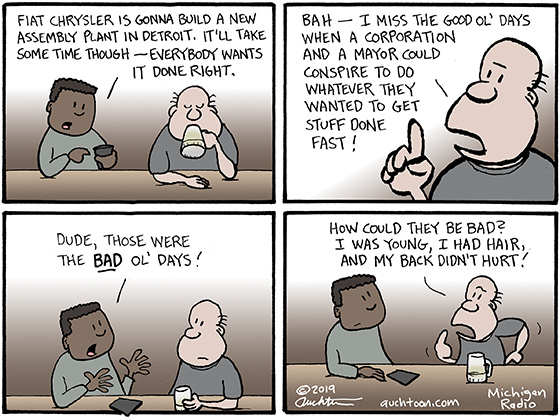Assembly Plants and Misplaced Nostalgia

In the late 1970s, Detroit was desperate for a new automobile assembly plant. GM was closing its plant on Clark Avenue and the land for the previously closed Dodge Main complex was available in Hamtramck. The only problem was that additional land was needed that reached into Detroit’s Poletown neighborhood.
In those pre-Great Recession times, any new auto facility — but especially an assembly plant — was almost universally considered an economic blessing and a community savior. Lots of good stable jobs, a magnet to suppliers, a taxpaying engine — no downside! Except, as it turns out, there were huge downsides. Detroit Mayor Coleman Young conspired with GM (as well as the Catholic Archdiocese) to acquire the land it wanted using a number of methods, grabbing it through eminent domain when necessary. It totally destabilized Poletown and never came close to delivering the promised number of jobs and tax dollars.
This week, Fiat Chrysler Automobiles (FCA) announced plans for a new Jeep assembly plant in Detroit, probably at the site of the former Mack Engine plant (plus some additional land). It seems very similar to 40 years ago, but it is really quite different. First, everybody involved seems keen to avoid the Poletown mistakes. Second, the city no longer has eminent domain power. Third, I think all Michiganders are much much better at moderating expectations around any new auto facility — we’ve seen enough come and go to know there are always tradeoffs.
Nostalgia can cloud our assessment about what was good about the good ol’ days. Some things were, in fact, better back in the day. (I sure do miss being able to dunk a basketball!) But that doesn’t mean everything was better.

